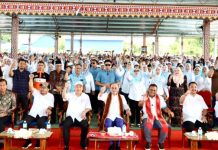KUALA LUMPUR: The Federation of Chinese Associations Malaysia (Huazong) has urged the government to clarify on whether it would continue to provide annual grants to vernacular schools in the country, Chinese independent schools and Chinese community-run higher learning institutions included, as this was not indicated in the Budget 2021.
In his comment on Budget 2021 which was tabled in the Parliament on Friday, its President Tan Sri T.C Goh said the government raising of the ceiling for statutory debt from 55% of the GDP to 60% has given more space for its expansionary Budget 2021, besides providing a larger allocation, as compared to this year’s Budget. He nonetheless expressed concern over the high government expenditure of more than 70% of its revenue.
He thus hoped the government could strive to take appropriate measures to close the gap of imbalance in government expenditure and revenue.
“This is important, so as to avoid operational expenditure from continuing to take up a huge chunk of the development expenditure that is much needed for pressing developments in our country.
“The government should also be cautious with the raising of the statutory debt ceiling to 60%, as if it fails to manage its finance prudently after this, it may inevitably aggravate financial imbalance and put more pressure on the national coffer, besides preventing it from achieving its aspiration of reducing the national deficit from 5.4% to 4%,” he cautioned.
However, Goh acknowledged that Budget 2021, which is the inaugural Budget of Perikatan Nasional (PN) government is essentially a people-friendly Budget that was well-drafted to assist the people and businesses to better cope with the devastating impact of the Covid-19 pandemic.
He commended the government for providing a host of aids, financing, tax reliefs and living allowances covering individuals, students, households, micro enterprises, young entrepreneurs, women folks. There’s also a one per cent reduction for individual income tax for those earning RM50,001-RM70,000 annually.
As for the small-and-medium enterprises (SMEs), especially the big corporations, he observed that the government has not done much, especially in regards to the much-anticipated corporate tax reduction which the government has not granted so as not to affect its revenue collection. Instead, the government opted to continue with or improve the previous aid packages, such as extension of moratorium on bank loans, hiring incentive under PERKESO, micro credit and a more flexible wage subsidy program, among others.
“As compared to previous measures taken, this time the government is adopting a more targeted measures, especially when comes to giving incentives and financing for business sector,” he said.
Goh who is also the President of The Federation of Chinese Associations Sabah (FCAS) also welcomed and supported the establishment of the Covid-19 Fund besides proposing an increase in Covid-19 Fund by RM20 billion to RM65 billion to fund the KITA PRIHATIN stimulus package, additional assistance for the rakyat and vaccine procurement. He hopes the government besides making the vaccine affordable to the people, could also provide free vaccination to the vulnerable and underprivileged groups.
Touching on the Education Ministry getting highest allocation at RM50.4 billion or 15.6 per cent of overall government expenditure, which includes RM800 million for the maintenance and repair of government schools and government-aided schools, he opined that like what had been practiced in the past, the government should provide a complete list of the beneficiaries, besides indicating how or where the money are going to be spent.
He was also puzzled with the non-available of detailed information on allocations for of various types of government-aided schools, Chinese schools included, which are earmarked for expansion or relocation.
He opined that the required funds should be allocated in the said Budget.
He also hoped Finance Minister Tengku Datuk Seri Zaifrul Tengku Abdul Aziz could further elaborate on the allocation of a total of 177 million ringgit for the Chinese community to improve educational facilities, housing and the development of new villages, as well as financing facilities through Bank Simpanan Nasional (BSN). Goh said this is necessary in view of the extensive scope of such allocation.
Goh went on to welcome the government allocation of a total of RM15 billion in Budget 2021 to implement key transport infrastructure projects which include the Pan Borneo Highway, Gemas-Johor Bahru Electrified Double-Tracking and Phase 1 of the Klang Valley Double-Tracking projects. Acknowledging that the implementation of these mega infrastructure projects could help propel business sector and stimulate economic growth, he hoped the government could quickly resume its negotiation with its Singapore counterpart, so as to expedite the implementation of Rapid Transit System Link from Johor Bahru to Woodlands, Singapore and MRT3 (Mass Rapid Transit 3) in Klang Valley.
He also welcomed and supported the government’s move to increase the allocation for Rubber Production Incentive from RM150 million to RM300 million to help stabilised the income of 150,000 rubber smallholders, during low market prices, besides allocating RM1.7 billion in the form of subsidies, assistance and incentives to farmers and fishermen.
He however hoped the government could relook into the exclusion of vegetable, fruits and flowers farmers from such assistance.
He also welcomed the government’s move to increase the lifestyle relief tax from RM2,500 to RM3,000 – with the extra RM500 relief specifically for sports-related expenses including registering in competitions. Digital news subscriptions are also covered by the lifestyle relief tax now.
He also lauded the government’s allocation of RM300 million to continue and expand the implementation of the My30 unlimited travel pass initiative to Penang and Kuantan, besides an unlimited monthly travel pass priced at RM5 would be introduced for school students from Year One to Form Six, and 1% cut in personal income tax, from the existing 14% to 13% for those earning RM51,000 to RM70,00 a year.
He was also glad to note that quite a number of measures in the Budget 2021 were in line with Huazong’s proposals to better assist the people and businesses amidst the pandemic.
Meanwhile, Goh opined that, amidst the persisting pandemic and its devastating impacts, especially with the country now experiencing the third wave, the government’s projection of 6.5% to 7.5% growth next year tends to be over optimistic.
Cautioning over the incidences of negative growth in April and June this year, coupled with deficit budget next year, besides an uncertain political and economic climate around the world, he hoped the government would be more prudent in its financial management, and to continue to stimulate domestic demand and boost export, so as to achieve speedy economic recovery.
He also called on the government to muster political will to start trimming its bloated civil service, and to revamp all those government-linked companies (GLCs) which are poorly managed and incurring heavy losses, besides introducing meritocracy, and a reward and punishment system, to better reform the nation’s civil service.-pr/BNN






